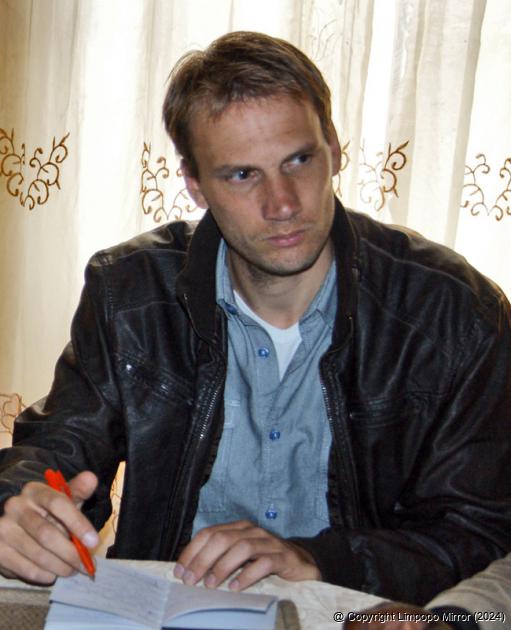

ADVERTISEMENT:

Mr Wiebe de Jong from the Netherlands, who is currently conducting his doctoral research into the symbolism of muti murders here in the Vhembe District, shared his insights into the infamous Freddy Tshikhudo "Hand Case".
“Hand case not a typical ritual murder case”
Louis Trichardt’s infamous “Hand Case” drew to a close on 2 July with the sentencing of Freddy Azwitamisi Tshikhudo (40) to life imprisonment, as reported upon in last week’s Zoutpansberger.
The newspaper is currently hosting a guest from the Netherlands, Mr Wiebe de Jong, who is conducting his doctoral research into the symbolism of muti murders here in the Vhembe District. Regarding the Tshikhudo case, De Jong shared his insights into the case, which has been widely regarded as a muti murder.
Over the last two years, the Zoutpansberger ran several articles about the ritual murder conducted by Freddy Tshikhudo. In 2013, he was seized in an Indian shop while waving around a human arm. After being arrested, he led the police to some nearby bushes and showed them the corpse to whom the arm belonged.
“Up to now, the authorities maintain that Tshikhudo committed a ritual murder because the victim missed some body parts (though one could not say whether these had been cut off or taken away by animals; except for the arm). It does not, however, display the features of a typical ritual murder,” said De Jong.
First of all, he explained, Tshikhudo acted on his own, while ritual murders are usually planned way ahead by a group of people. “The archives of the Thohoyandou High Court contain quite a lot of court cases in which a group of usually three to four men ambush a chosen person and strip the victim of particular body parts. Usually, one of the group is the instigator, who wants to improve his position with medicine made of human material, and he carefully selects people around him to seize the victim,” he said, adding that Tshikhudo never sought the help of others, let alone a traditional healer to produce muti.
Secondly, De Jong said, ritual murder cases are characterized by the fact that body parts are cut off while the victim is still alive. “Some anthropologists have also noted that the screams of the victim would supposedly alert the ancestors, while others argue that a ‘fresh’ body part contains more medicinal power,” said De Jong. In Tshikhudo’s case, however, he testified that he had cut off his victim’s arm more than a week after she had passed away. “That is rather late for it to be classified as a ritual murder,” said De Jong.
De Jong said that to find a more acceptable motive for the murder, one should rather try to shed light on the relationship between Tshikhudo and his victim. According to Tshikhudo’s testimony, they had had a secret relationship, which the deceased wanted to end. “Moreover, she allegedly unmasked Tshikhudo’s adulterous relationship when she phoned his wife. As such, it might be possible that the motive was not a ritual murder, but one of revenge. Anthropologists have shown that the dishonour felt by an abandoned lover can be so fierce that the only way to ‘remove and cleanse its stains is by shedding blood’. By cutting off particular body parts such as the victim’s private parts, as Tshikhudo had allegedly done, ultimate vindication is found, through a literal amputation of one’s honour and dignity,” said De Jong
When studying the practice of ritual murders, De Jong said, attention should not only be paid to the fact that body parts are missing. “Rather, we should look for connections between the ones involved and the context in which it happened. If you perceive it from that perspective, Tshikhudo’s murder looks more like a crime of passion,” said De Jong.
The question remains why Tshikhudo decided to cut off the victim’s arm after her death. “A simple answer could be that Tshikhudo is aware of the illicit trade in body parts and thought that he was able to sell it for a good price. But that did not seem to be the initial motive as it was done a week after, but rather a choice to make quick money. A wrong decision, as it proved to be, because that started the court case for which he has now been sentenced to life imprisonment,” said De Jong.
Date:16 July 2015
By: Isabel Venter
Isabel joined the Zoutpansberger and Limpopo Mirror in 2009 as a reporter. She holds a BA Degree in Communication Sciences from the University of South Africa. Her beat is mainly crime and court reporting.
Read: 2484

ADVERTISEMENT

ADVERTISEMENT:

ADVERTISEMENT:

Recent Articles
-

Vocalist raises voice GBV problem
19 April 2024 By Elmon Tshikhudo -

‘Mukoma vho tshinyadza ndaka yanga’
19 April 2024 By Kaizer Nengovhela -

Department shuts down Ziggy School
19 April 2024 By Thembi Siaga -

Vhamusanda Vho Mulingoni Eric “Rambo” Tshivhase vho dzama
19 April 2024 By Victor Mukwevho -

Tshikolo tsha Russell Bungeni tsho netshedzwa tshifhaṱo tsha saintsi
19 April 2024 By Khathutshelo Raliphaswa

ADVERTISEMENT

Popular Articles
-

Leopards’ top striker dreams of playing for Kaizer Chiefs
22 March 2024 By Frank Mavhungu -

Well-known inventor, Prof Mulalo Doyoyo, dies
14 March 2024 By Victor Mukwevho -

Lesley Manyathela stadium remains a 'white elephant' to local clubs
23 March 2024 By Kaizer Nengovhela -

Murder suspect appears in Mutale Court
22 February 2024 By Victor Mukwevho -

Masindi case likely to introduce new era of customary law
24 February 2024 By Anton van Zyl -

Park development leaves residents puzzled
22 March 2024 By Andries van Zyl -

Many questions as man shoot himself in the head
15 March 2024 By Elmon Tshikhudo

